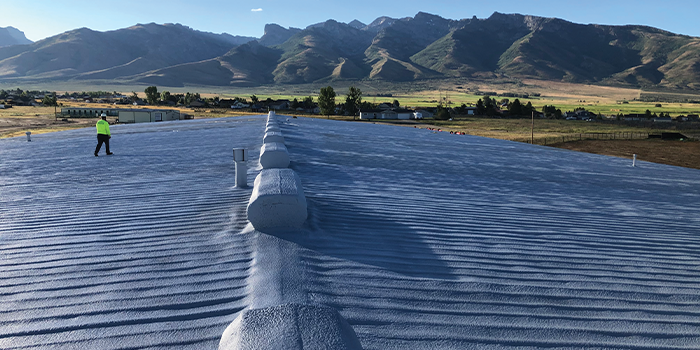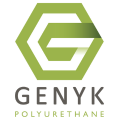A Cool Solution


SPRAY FOAM MAGAZINE – Most people do not realize the small yet critical role that spray polyurethane foam can have in protecting the quality of eggs throughout the farm to table process. A key aspect of high standard eggs is the integrity of the cooler they are stored in during processing. A compromised cooler can lead to air loss, which causes moisture and mildew, and can ruin entire batches of eggs. Spray Foam Insulation, LLC in Pikeville, KY offers poultry plants a solution to reduce egg waste and save energy on air conditioning expenses. It involves sanitizing and then spraying the entire cooler with spray foam insulation to keep cool air in and moisture out.
Brad Johnson is the co-owner and lead installer of Spray Foam Insulation, and he has completed a number of projects for the egg and poultry industry. A representative from Cal-Maine Foods approached Brad about applying spray foam to the sidewalls of a large egg cooler. After successfully completing this project for Cal-Maine, Brad and his team went on to perform similar services for big name poultry clients like Tyson and Purdue, plus smaller operations. They have worked on coolers with dimensions ranging from 10x10 feet, to as big as 40x40 feet. Though every job is different, from start to finish, most coolers are finished in a standard eight-to-10-hour shift with an average crew of five. To reduce interruption to the client’s production process, they complete most projects during the night shift. Typically, Spray Foam Insulation’s crew follows a similar protocol and process each time, which guarantees a completely sealed and mildew-resistant cooler built to last throughout the life of the building.
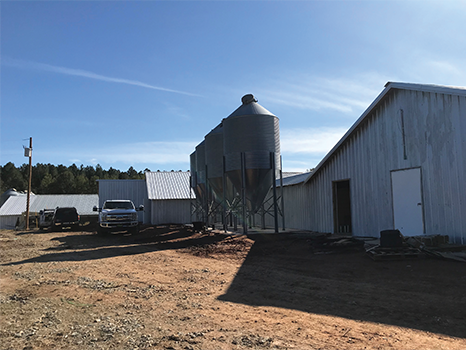
Before starting the foaming process, they empty the cooler and clean the sidewalls with a pressure washer. Most cooler sidewalls are made out of aluminum or steel, which are both excellent substrates to apply spray foam to once they are cleared of dirt, debris, and mold. To protect themselves from mold spores and fumes, the team dons gloves, goggles, a respirator, and protective coveralls while working. To ensure the best foam adhesion possible, anything that comes in contact with the foam must be thoroughly cleaned. Pressure washing the sidewalls and allowing them time to dry completely, the substrate undergoes mold treatment. Depending on the extent of the mold, Brad’s team might utilize a combination of tools like mold foggers, brushes, vacuums, and disinfectant solutions to remove mold spores completely. They then apply a mold barrier to prevent the mold from returning. The mold treatment removes any existing spores and mold traces while preventing future growth.
After pressure washing, mold treating, and thoroughly drying, the substrate is ready for the foam application. Brad and his crew apply two to three inches of GacoOnePass Closed-Cell Foam. To get a clean, even coating, they applied the foam in layers, making even passes until the foam layer reaches a thickness of two to three inches. Using an industrial airless sprayer, the foam is then covered in an FDA-approved coating that is paint-like, while also acting as a sealant. This coating is approved for incidental food contact, which means it is safe to use and specially rated for use in facilities that process food products. The exact brand and type of coating used varies per plant specification, but most are made out of silicone, like MasterBond. After applying the foam and the coating, they ventilate the coolers with fans for 24 hours. After ventilating, the coolers are ready to store eggs once again.
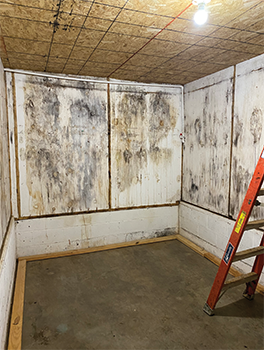
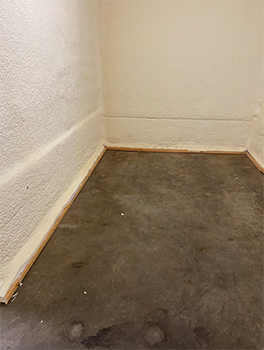
Ensuring optimal conditions inside of the egg coolers are integral to producing high quality, kitchen-ready eggs. Eggs are delicate products, and not just because of their shells – if not kept in the perfect climate and sanitation conditions, eggs can become breeding grounds for bacteria. Per USDA standards, eggs in production, storage, or transport must be refrigerated below 45 degrees Fahrenheit, and many factories opt to keep their coolers at a steady 44 degrees for optimal freshness. This temperature requirement places quite a demand on the cooler’s AC units, especially if the cooler’s sidewalls are not properly insulated. Even small vulnerabilities in the cooler’s sidewalls can lead to air loss, causing humidity in the coolers to skyrocket. High humidity and sweating issues are a death toll for a cooler full of eggs, which can easily grow bacteria and become unsafe for sale. High humidity also promotes rampant mold and mildew growth in untreated coolers. Inadequately insulated coolers can lead to profit loss due to egg waste, high power bills, and reduced life of the AC units. Fortunately, closed-cell spray foam offers cost-effective solutions for reducing cooler air loss while also maintaining the high sanitation standards expected of egg coolers.
Brad has seen firsthand the difference spray foam insulation makes regarding the quality of cold, dry air within an egg cooler. He explains, “Using spray foam as an insulator not only prevents air loss, it also serves as a vapor barrier to prevent condensation.” The ability to insulate while also fighting against moisture are two attributes that make spray foam well-suited for use in industrial egg coolers. SPF’s water-resistant properties function as a vapor barrier, ensuring that conditions within the cooler stay mold and mildew resistant. Spray foam’s high R-value means it works great as an insulator meant to safeguard highly sensitive products like eggs. Furthermore, the process of insulating egg coolers with SPF is safe, fast, and more cost effective than wasting eggs that have gone bad due to unstable temperature conditions or continually repairing or replacing air conditioning units.
Coating cooler sidewalls in foam is more cost effective than paying high maintenance costs associated with overworked AC units, especially in hot climates. Brad explains the heavy burden on the cooler’s AC units, “Some of the units were working against outside temperatures up to 105 degrees F. These high outdoor temperatures combined with poorly insulated coolers means many facilities faced high costs related to AC unit maintenance, repair, and replacement. With these mounting costs in mind, the poultry plant’s decision to insulate egg coolers with spray foam made both practical and economic sense.”
The benefits of using SPF for cold storage operations are clear. When applied to cooler walls, closed-cell spray foam insulates against air loss, prolongs the life of AC units, prevents mold and mildew growth, and protects the quality of each egg stored in the cooler. Applying spray foam is minimally invasive and does not disrupt poultry plant operations, and the end result assures that conditions within egg coolers are as sanitary and high quality as possible.
For use by SprayFoamMagazine.com & Spray Foam Magazine
Disqus website name not provided.




